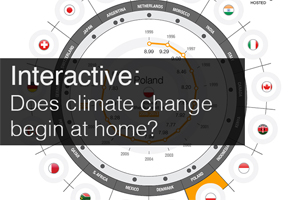Climate summit in overtime due to deadlock
Delegates from more than 190 nations, meeting in Warsaw, argue on outline of new global pact to tackle climate change.

UN climate talks ran deep into extra time in Warsaw in an attempt to lay some groundwork for a climate pact which must be signed in Paris by December 2015.
The summit in the Polish capital was scheduled to end on Friday, but on Saturday morning negotiators and ministers were still debating, as rich and poor nations weighed their respective contributions to the goal of slowing the warming of the planet.
Gathering delegates from more than 190 nations, the fractious annual negotiations are working towards a deal that will for the first time bind all the world’s nations to curbing greenhouse gas emissions.
On current emissions trends, scientists warn the Earth could face warming of 4.0 C or higher over pre-industrial levels – a recipe for catastrophic storms, droughts, floods and sea-level rise that would hit poor countries disproportionally hard.
The EU chief is responsible for damaging seriously the atmosphere of confidence and trust in this process.
Many delegates also said they wanted a clearer understanding of when nations will publish their plans for long-term cuts in greenhouse gases in the run-up to a summit in Paris in 2015.
That meeting is meant to agree on a global climate pact to enter into force in 2020.
World leaders last tried, and failed, to agree to a global treaty at a summit in 2009.
“If we don’t succeed in Paris, the chances of us meeting the goal of limiting global warming to two degrees will be limited, or none,” Pascal Canfin, French development minister, said on Friday.
A text on Saturday said that all nations should submit “intended nationally determined commitments” by the end of the first quarter of 2015, if they could.
That would give time to compare and review pledges before the Paris summit.
The US is among those advocating pledges be made by the end of the first quarter of 2015.
“It’s something to build on,” said Connie Hedegaard, said European climate commissioner, who wants pledges in 2014.
But many developing nations say the rich are doing too little to lead.
“The political signals [for Paris] are just too weak,” said Naderev Sano, a Philippine delegate fasting during the meeting
in sympathy with victims of Typhoon Haiyan which killed 5,200 people.
Hotly disputed exchange
A major sticking point was the insistence of some developing nations like China and India, whose growth is fuelled by fossil fuel combustion, on guarantees of less onerous emissions curbs compared to wealthy nations.
In hotly disputed language, some want the new deal to impose “commitments” on developed countries and seek only “efforts” from emerging economies. The issue led to Europe and a group of developing economies trading barbs on Friday evening.
Hedegaard accused a group of “like-minded” countries of opposing a “push” towards the 2015 deal by insisting on the rich-poor country firewall.
 |
“It is not acceptable to the European Union, but I also think to really many others,” she said.
A group calling itself the Like-Minded Developing Countries, which includes China and India as well as Pakistan, Malaysia, the Philippines, Saudi Arabia and Venezuela, took issue with what they called the “brazen attack”.
“The EU chief is responsible for damaging seriously the atmosphere of confidence and trust in this process,” Claudia Salerno, Venezuel’s climate envoy, who claimed to speak on the group’s behalf, said.
As emissions continue to grow year after year, developing nations say their developed counterparts must have more responsibility for curbs given their long history of fossil-fuel combustion.
The West, though, insists emerging economies must do their fair share, considering that China is now the world’s biggest emitter of CO2, with India in fourth place after the US and Europe.
Climate aid
Another point of disagreement is finance.
Developing nations insist that wealthy nations must show how they intend to keep a promise to ramp up climate aid to $100bn by 2020, up from $10bn a year from 2010-12.
Still struggling with an economic crisis, however, the developed world is wary of unveiling a detailed long-term funding plan at this stage.
The funding crunch lies at the heart of another issue bedevilling the talks: demands by developing countries for a “loss and damage” mechanism to help them deal with future harm from climate impacts they say are too late to
avoid.
Rich nations fear this would amount to signing a blank cheque for never-ending liability.
Governments have shown their firm commitment to reduce emissions from deforestation and forest degradation
“On finance there has been no progress,” Claudia Salerno of Venezuela, who represents a group of developing nations including China and Indonesia, said late on Friday.
The talks were also considering a new “Warsaw Mechanism” to help developing nations cope with loss and damage from extreme events such as heat waves, droughts and floods, and creeping threats such as rising sea levels and desertification.
Developing nations insisted on a “mechanism” – to show it was separate from existing structures – even though rich countries say that it will not get new funds beyond the planned $100 b a year from 2020.
In one step forward, governments agreed to a set of rules for safeguarding tropical forests in a deal aimed at unlocking big investments.
The new plan is backed by $280m from the US, Britain and Norway.
Deforestation accounts for perhaps a fifth of greenhouse gas emissions from human sources. Trees release carbon when they rot or burn.
“Governments have shown their firm commitment to reduce emissions from deforestation and forest degradation,” Christiana Figueres, UN climate chief, said in a statement.